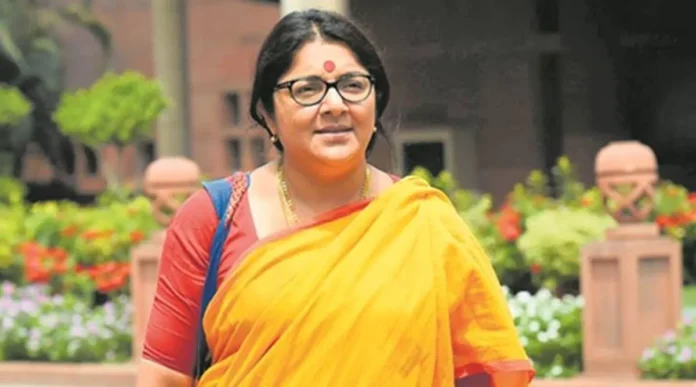Recently, Locket Chatterjee, a prominent Bharatiya Janata Party (BJP) leader and Member of Parliament, has leveled serious allegations against the ruling Trinamool Congress (TMC) party. Chatterjee has accused the TMC of intentionally misleading the public, sparking a new chapter in the ongoing political saga of the state.
The accusations come at a crucial juncture in West Bengal’s political narrative, with both the BJP and the TMC vying for supremacy ahead of the upcoming elections. Locket Chatterjee, known for her fiery rhetoric and staunch allegiance to the BJP, has not minced her words in condemning the TMC’s alleged actions. According to Chatterjee, the TMC has resorted to deceit and misinformation to sway public opinion in its favor, tarnishing the democratic process in the state.
Chatterjee’s allegations center on various aspects of the TMC’s governance and political strategies. She claims that the TMC has propagated false narratives about the BJP’s policies and intentions, seeking to instill fear and uncertainty among the electorate. Furthermore, Chatterjee accuses the TMC of orchestrating smear campaigns and spreading propaganda to undermine the credibility of opposition parties, including the BJP.
The BJP leader’s accusations reflect the deep-rooted animosity and polarization that characterize West Bengal’s political landscape. The state has been a battleground for ideological clashes between the TMC’s brand of regionalism and the BJP’s nationalist agenda. Against this backdrop, accusations of misinformation and manipulation only serve to exacerbate existing tensions and deepen political divisions.
However, it is essential to scrutinize Chatterjee’s claims through a critical lens. While allegations of political misconduct are not uncommon in democratic societies, substantiating such claims with evidence is paramount. The burden of proof rests on the accuser, and without concrete evidence to support her allegations, Chatterjee’s accusations may be perceived as mere political rhetoric aimed at scoring points against her opponents.
Nevertheless, Chatterjee’s allegations raise important questions about the integrity of political discourse in West Bengal and the role of misinformation in shaping public opinion. In an era dominated by social media and digital communication, the spread of false information has become a pervasive challenge, often blurring the lines between fact and fiction. The prevalence of misinformation poses a significant threat to the democratic process, undermining trust in institutions and eroding the foundation of a well-informed electorate.
The TMC has vehemently denied Chatterjee’s allegations, dismissing them as baseless and politically motivated. According to TMC spokespersons, the party remains committed to upholding the principles of transparency and accountability in its governance. They argue that the BJP’s accusations are a desperate attempt to deflect attention from its own shortcomings and failures.
The war of words between the BJP and the TMC underscores the high stakes involved in West Bengal’s political arena. With the state elections looming on the horizon, both parties are leaving no stone unturned in their quest for electoral victory. The accusations and counter-accusations flying back and forth reflect the intensity of the political battle unfolding in the state.
As the political drama unfolds, it is essential for voters to exercise discernment and critical thinking. In a climate marked by polarization and propaganda, it is easy to fall prey to misinformation and manipulation. As guardians of democracy, voters must demand accountability from their elected representatives and hold them to the highest standards of integrity and honesty.
In addition, Locket Chatterjee’s accusations against the TMC shed light on the complex dynamics at play in West Bengal’s political landscape. While allegations of misinformation and political misconduct are not uncommon, it is essential to approach such claims with skepticism and scrutiny. As the state gears up for elections, the onus is on voters to sift through the noise and make informed decisions that will shape the future of West Bengal.

